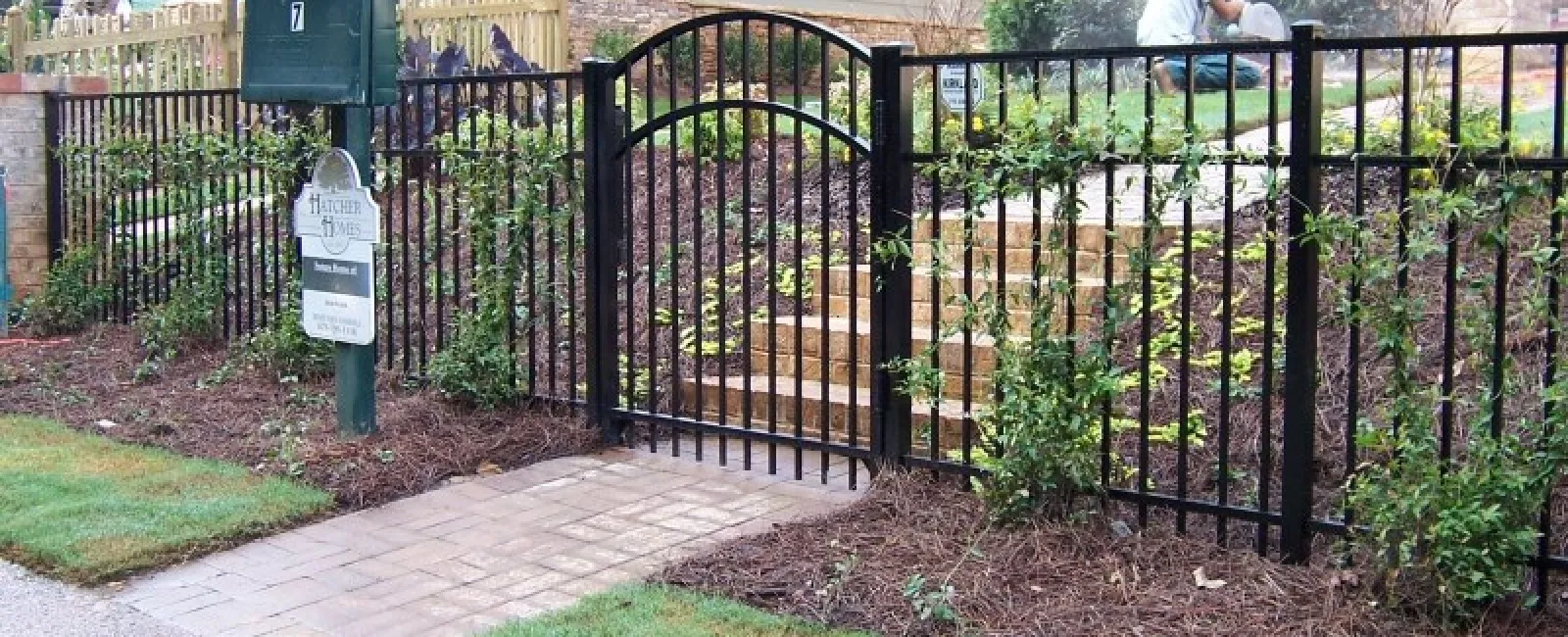Building is booming in the Atlanta area. If you’re a commercial developer with a new residential community in the works, you’re probably considering installing a neighborhood perimeter fence. An HOA fence gives your community a more exclusive and protected feel, improving curb appeal and property values. It also helps keep trespassers and unwanted animals from entering the property, enhancing security. Both of these factors are important selling points.
But what is the best perimeter fencing material for residential communities? We’ll walk you through the drawbacks and benefits of various types to help you choose the right neighborhood fence for your project.
Common HOA Fence Materials
Houses in gated communities can bring an average $30,000 selling price than their non-gated counterparts. Even without gates, most homebuyers appreciate the extra security and upscale aesthetic that a neighborhood fence provides. Additionally, homes that border the main road or the outer edges of the community benefit from enhanced privacy.
Those homeowners, in equal partnership with the community HOA, are often responsible for fence upkeep after the final building phase is complete. Therefore, it’s important to consider things like maintenance requirements and replacement costs when choosing your fencing material.
Here are some popular choices:
Wood Fences
Wood has long been a favored material for perimeter fences of all kinds. Relatively inexpensive and easy to install, wood adds a warm, traditional touch to a neighborhood. Here are some additional benefits of wood fences:
- Privacy and Noise Reduction: Depending on the fence style, a wood HOA fence can offer superb privacy. Because wood is a natural sound absorber, it also helps reduce unwanted noise from nearby roads.
- Visual Appeal: Wood is a favorite building material for a reason. From ranch rail fences to privacy stockade, wood lends a touch of character and timelessness to any property.
- Design Versatility: Of all common fencing materials, wood is perhaps the easiest to customize. You can build a wood fence to suit almost any height or functional requirements, as well as any style.
However, it’s also important to consider wood’s drawbacks:
- Frequent Maintenance: Wood is subject to splitting, warping, and rotting, especially in hot and humid climates. It’s also vulnerable to insect infestation, all of which can lead to time-consuming and sometimes costly repairs. Additionally, wood needs to be painted or stained every 2-3 years to keep it looking its best.
- Limited Lifespan: Even with regular maintenance, wood has a shorter “shelf-life” than other fencing materials. It will likely require replacing in 10-15 years.
Composite Fences
As an alternative to wood, composite fencing is an increasingly popular choice for perimeter fencing. Comprised of recycled wood fibers and plastic, it offers similar visual appeal with improved durability. Here are some reasons to consider composite for your HOA fence:
- Environmental Friendliness: Because they’re made from recycled materials, composite fences are good for the environment. They also don’t require painting, staining, or treating for insects, reducing the need for harsh chemicals that can leach into the surrounding soil.
- Design Options: Composite fences come in numerous color, style, and design options. They also contain wood pulp, giving them a similar texture and visual appeal.
- Low-Maintenance: Since they don’t need to be painted or stained and don’t warp, composite fences require very little maintenance. They also last longer than wood, remaining sturdy and attractive for up to 30 years.

There are a few things to consider when choosing composite for your fencing material:
- Higher Cost: Composite fences tend to be more expensive than some other fencing materials. However, given their low maintenance needs and long lifespans, they’re quite cost-effective in the long run.
- Fades in Bright Sunlight: The Atlanta area enjoys plenty of sunshine, which can fade or weather your composite fence over time.

PVC/Vinyl Fences
Offering similar styles to wood and composite, PVC fencing is a popular choice for HOA communities due to their durability. Available in a wide range of styles and colors, PVC can enhance a neighborhood without requiring a lot of upkeep.
The advantages of PVC/vinyl fences include:
- Low Maintenance Needs: High quality vinyl fences are easy to clean, resist rot, warping, and cracking, and don’t attract insects. Aside from an annual wash, they’re almost maintenance-free.
- Long Lifespan: Because they’re made from polyvinyl chloride, a PVC fence will last for years, even in harsh weather conditions.
- Superior Privacy: PVC/vinyl fences are available in solid panels. These panels provide optimal privacy for the homes to which they’re adjacent.
However, it’s important to consider the following when choosing a vinyl HOA fence:
- Less Natural Appearance: Some manufacturers offer simulated wood grain. However, PVC lacks the “feel” of real wood. If your neighborhood is aiming for a rustic or natural aesthetic, PVC may not be the best choice.
- Higher Up-Front Cost: Depending on the quality, PVC/vinyl can be more expensive to install than other fencing materials. However, their low maintenance needs mean they can still be cost-effective.
Aluminum Fences
For a completely different look, consider aluminum fencing. With elegant pickets, intricate inset panels, and decorative finial options, an aluminum fence adds a sophisticated feel to any property. Aluminum also offers other benefits:
- Durability: Aluminum fences benefit from a powder coating that makes then resistant to rust and corrosion. Their long lifespan makes them an excellent long-term investment for residential communities.
- Attractive Appearance: When it comes to elegance, aluminum is a top choice for a neighborhood fence. It lends an upscale feel to your property and complements almost any aesthetic.
- Rackability: Aluminum is what is known as a rackable material. That means it’s designed to closely follow the terrain where it’s installed, eliminating gaps along the bottom.
- Low Maintenance: Aluminum fences require very little upkeep. They never need to be painted and are very easy to clean with mild detergent and water.
Aluminum fences are not without their drawbacks:
- Limited Privacy: Due to their open picket designs, most aluminum fences don’t provide much privacy. However, they can be combined with evergreen shrubbery or other landscaping features to block the view of the neighborhood from the road.
First Fence of Georgia is Your Trusted HOA Fence Installation Partner
Choosing the best HOA fence can be an an important part of your neighborhood’s success. At First Fence of Georgia, we have almost twenty years of experience installing commercial and residential fences all over metro Atlanta. We will be happy to answer your questions so that you can make an informed decision. Contact us today to get started.


